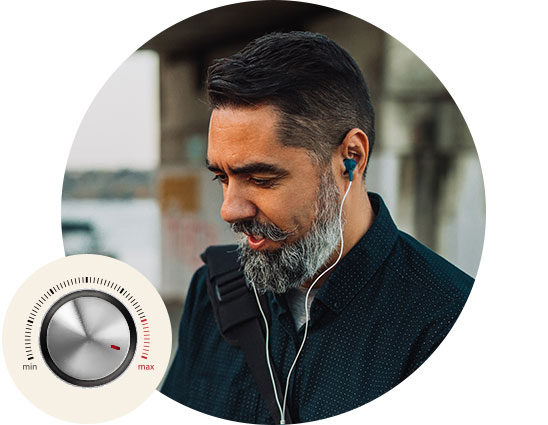Online tinnitus test
People with tinnitus often experience hearing loss too. Our quick online tinnitus test can help give you an idea of whether or not you might have tinnitus and/or hearing loss, and what you can do about it.

Tinnitus (ringing in the ears or head) is a common symptom of hearing loss. In fact, an estimated 90% of people with tinnitus have some degree of hearing loss.[1]
There are many ways to alleviate tinnitus symptoms, with hearing aids being one of the most effective tools.
1. Exposure to loud, sudden, or excessive noise
2. The natural ageing process
3. Middle ear infections
4. Head, neck, and/or temporomandibular joint (TMJ) injuries or dysfunction
5. Headaches and migraines
6. Reaction to medication
7. Emotional distress
8. Diabetes
9. Hyperacusis (intolerance to noise)
10. Other untreated medical conditions such as Ménière's disease, otitis media (middle-ear infection), etc.


People with tinnitus often experience hearing loss too. Our quick online tinnitus test can help give you an idea of whether or not you might have tinnitus and/or hearing loss, and what you can do about it.
* The result of the test may only be used for guidance. Official conclusions about hearing loss/tinnitus can be provided by our registered hearing care experts.
* The result of the test may only be used for guidance. Official conclusions about hearing loss/tinnitus can be provided by our registered hearing care experts.
* The result of the test may only be used for guidance. Official conclusions about hearing loss/tinnitus can be provided by our registered hearing care experts.
* The result of the test may only be used for guidance. Official conclusions about hearing loss/tinnitus can be provided by our registered hearing care experts.
While it's unlikely that stress may be a direct cause of tinnitus, research shows that there could be a link.2
Some main causes of stress include bereavement, emotional or physical health changes, divorce, feeling under pressure, facing big changes in your life, and excess worry about something. The stress this puts on your mind and body may cause temporary tinnitus, or cause existing tinnitus to flare up.
But tinnitus can cause stress and anxiety, and affect people in different ways and to different degrees. Some also find that it makes them irritated or depressed, while others aren't affected much or at all. Tinnitus may also make it difficult to fall asleep and stay asleep.

There are some medications that can affect your ears and your hearing health; these are referred to as being ototoxic.
Which medications can cause tinnitus?
Ototoxic drugs may temporarily intensify tinnitus symptoms, while some are thought to cause tinnitus and/or long-term hearing loss. There are more than 200 known ototoxic medications (prescription and over-the-counter) on the market today.3
Ototoxic drugs are often used for purposes where the benefits outweigh the risks of hearing loss or tinnitus. It's always a good idea to ask your doctor about the potential side effects when prescribed a new medication.


The better you hear, the less your tinnitus stands out.
Hearing aids amplify sounds around you, which helps redirect your attention away from the tinnitus sounds. Your brain can focus more easily on external sounds, making your tinnitus less noticeable.
The latest hearing aid models even have specially designed programmes with built-in, soothing sound options to help ease your tinnitus symptoms.
1. https://hearinghealthfoundation.org/hearing-loss-tinnitus-statistics
2. Ciminelli, P., Machado, S., Palmeira, M., Carta, M. G., Beirith, S. C., Nigri, M. L., Mezzasalma, M. A., & Nardi, A. E. (2018). Tinnitus: The Sound of Stress?. Clinical practice and epidemiology in mental health : CP & EMH, 14, 264-269.
3. https://www.asha.org/public/hearing/Ototoxic-Medications/
4. Jafari, Z., Kolb, B., & Mohajerani, M. (2022). Hearing Loss, Tinnitus, and Dizziness in COVID-19: A Systematic Review and Meta-Analysis. Canadian Journal of Neurological Sciences, 49(2), 184-195.
5. https://www.nidcd.nih.gov/health/tinnitus#2
6. https://www.thelancet.com/journals/laneur/article/PIIS1474-4422(13)70160-1/abstract
7. https://hearinghealthfoundation.org/tinnitus-resources#tinnitus-causes